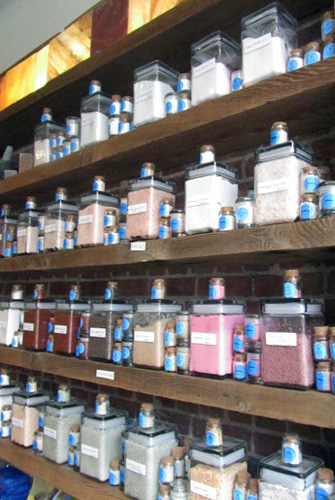Exploring The World of Salt
What We Can Learn From A Selmelier
By now you've probably gotten rid of that blue cylinder of table salt and have replaced it with kosher salt. At least I hope you have. Maybe you keep a small packet of fleur de sel or English Maldon flaked salt for those times when you want to give a crust to a good steak or finish an arugula salad. Or you bought a salt grinder plus a little dish to hold the kosher salt, and finally got rid of the shaker that always clogged up anyway. So you think you've got the cooking with salt thing figured out.
Maybe not. As I have recently learned from Mark Bitterman, there is much more to know.
Mark Bitterman is a selmelier -- an expert in culinary salt. With his wife Jennifer Turner Bitterman, he owns The Meadow, an artisanal boutique that specializes in salt, plus bitters and chocolate. The Meadow sells via a website and at shops in Portland, Oregon and Manhattan's Greenwich Village to customers who include restaurant chefs, some specialty food companies, and home cooks.
He's also an author who has been nominated for both IACP and James Beard Awards for his new book, Salted: A Manifesto on the World's Most Essential Mineral, With Recipes ($35.00, 312 pages, hardcover with color photographs, Ten Speed Press).
The book is the kind that you will read for interest and keep as a reference because it has a field guide to 80 varieties of artisanal salts. Written with a lively narrative and packed with tips and details, Salted is filled with history, geography and chemistry, and it provides useful answers to such questions about how iodine ended up in table salt, the differences between natural salt versus factory made, and how sea salts differ from quarried salts. And much more.
Most of all, Mr. Bitterman wants us to know how culinary salt makes a difference in how our food tastes. An enthusiastic and knowledgeable home cook, he writes about salting "strategically" and salting "mindfully," and gets very specific about the kinds of salts we should have in our pantries -- and when to use which.
[It's impossible to even touch on the topic of salt without acknowledging the health debate surrounding it. I believe in, and try to practice, all things in moderation. But I am not your doctor and you have to make you own choices when it comes to food, nutrition and health, including adding salt to your food.]
Salted includes about 50 recipes divided by the way salt is used in a dish. For example, there's a section on curing, another on brining, and a particularly useful set of recipes that show how to cook on the large, pink slabs of Himalayan salt that are increasingly common to find in culinary shops. The recipes also include classics notable for their essential use of salt, including gravlax, preserved lemons, sauerkraut, salt caramel, and an uncommon take on popcorn.
We’ve been given permission to publish two of Mark's recipes: Blanched Spring Peas With Saffron Crème Fraîche and Cyprus Flake Salt and his Alaea Hawaiian Bloody Mary (Alaea Hawaiian is a type of salt used to rim the glass). See our links to both.
What makes this book a stand-out is its combination of scholarship and passion. Some of Mr. Bitterman's writing is a bit florid but you will forgive him an occasional heavy hand with an adverb because he so wants you to appreciate the difference that an informed and disciplined use of this most common -- and most misunderstood -- ingredient in all our world's cuisines.
We recently visited Mark Bitterman at his New York Hudson Street shop, its walls filled with 100+ types of salt (and almost as many different chocolates) that ranged in color from snow white to rose to gold to black, in textures that varied from fine powder to like tapioca pearls and even larger moth balls, from reefs off of Bali, Hawaiian volcanoes, the Andes, and Lake Assal in Djibouti. We talked with him about his book, how saltshakers came to be, the three salts every home cook should keep on hand, and why kosher salt may be the gold standard in restaurants but not for us.
See our link to our conversation with him, a podcast worth listening to because it just might change the way you cook.
